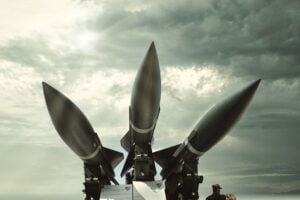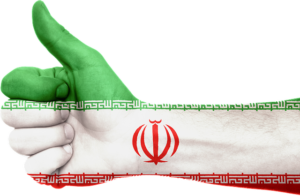Why did Iran launch missiles at Israel?
Iran launched a large-scale missile and drone attack on Israel in response to an Israeli airstrike on its consulate in Damascus, which killed several senior Iranian military officials. This marked Iran’s first direct assault on Israel in nearly 50 years, signaling a significant shift in regional tensions. Supreme Leader Ayatollah Ali Khamenei and the IRGC saw the strike as a necessary act of retaliation to maintain their deterrence power and prevent future attacks.
Over 300 drones, ballistic missiles, and cruise missiles were deployed, targeting Israeli military sites such as the Nevatim airbase. The attack also had geopolitical implications, momentarily diverting attention from Gaza while bolstering Iran’s influence in the Muslim world. Iran positioned its actions as self-defense under international law, referencing the Vienna Convention and Article 51 of the UN Charter.
Economically, the attack caused Iran’s currency to drop to record lows, while financial markets reacted with caution. While Iran’s strike demonstrated its military capabilities, it also heightened the risk of further escalation in an already volatile region.
Why did Iran launch missiles at Israel?
In a historic escalation, Iran launched its first direct military strike on Israel in nearly 50 years, unleashing a massive barrage of drones and missiles. This attack came in retaliation for an Israeli airstrike on Iran’s consulate in Damascus, Syria, on April 1, which killed senior Iranian military officials, including top commanders of the Islamic Revolutionary Guard Corps (IRGC). The assault marks a dramatic shift in the long-standing shadow war between the two nations, bringing their hostilities into the open and raising fears of a wider regional conflict.

Why Iran Took Action
Iran’s leadership, including Supreme Leader Ayatollah Ali Khamenei, viewed the bombing of its consulate—a diplomatic site protected under international law—as a blatant violation of its sovereignty. The strike eliminated key IRGC figures, such as Brigadier General Mohammad Reza Zahedi, who oversaw Iran’s covert operations in Syria and Lebanon. For Iran, failing to respond forcefully risked undermining its credibility as a regional power and emboldening Israel and its allies to launch further attacks. By retaliating openly, Iran aimed to signal that it would no longer tolerate direct assaults on its personnel or territory.
The attack also served domestic objectives. With Iran’s economy struggling and public discontent rising, the government sought to rally national unity by projecting strength against a longtime adversary. The IRGC, which holds significant political influence, framed the assault as fulfilling a “sacred promise” to defend Iran’s sovereignty, reinforcing its role as the nation’s protector.

The Mechanics of the Attack
On April 13, Iran launched over 300 drones and missiles toward Israel, marking the largest drone attack in modern history. The assault included advanced weapons such as Shahed-136 “suicide” drones, hypersonic Shahed-238 models, Emad ballistic missiles, and Paveh cruise missiles. These were aimed at Israeli military installations, including the Nevatim airbase, which Iran claims was used to coordinate the consulate strike.
The attack was meticulously planned. Drones, which travel slowly, were launched first to overwhelm Israel’s air defenses, followed by faster cruise and ballistic missiles. However, the vast majority of the projectiles were intercepted by Israel’s Iron Dome, with support from the U.S., U.K., France, and Jordan. Only a handful caused minor damage, highlighting the effectiveness of Israel’s defense systems while also exposing vulnerabilities to large-scale, coordinated attacks.
Regional and Global Repercussions
The strike temporarily shifted global attention away from Israel’s war in Gaza, where over 33,000 Palestinians have been killed. Iran sought to position itself as a leader of Muslim solidarity against Israel, contrasting its aggressive stance with the cautious diplomacy of regional powers like Saudi Arabia and Turkey. However, the attack also risked alienating Arab states seeking to avoid further instability.
At the United Nations, Iran justified its actions as self-defense under Article 51 of the UN Charter, arguing that Israel’s consulate strike violated the Vienna Convention on diplomatic protections. While Western nations condemned Iran’s escalation, some Global South countries expressed sympathy for its legal argument, underscoring the polarized international response.

Economic Fallout in Iran
The attack exacerbated Iran’s economic woes. In the days following the strike, the Iranian rial plummeted to a record low of 705,000 against the U.S. dollar, reflecting public anxiety over potential Israeli or U.S. counterstrikes. Tehran’s stock market also dipped, and the government cracked down on media outlets reporting on the economic turmoil, arresting journalists and blocking negative coverage. These measures highlighted the regime’s fear that domestic unrest could overshadow its military posturing.

Risks of Escalation
While Iran signaled that its retaliation was “concluded,” it warned of a “larger and more severe” response if Israel retaliates. For now, both sides appear cautious: Israel’s war cabinet debated response options, while the U.S. urged restraint. However, the attack has deepened regional tensions, with allies like Hezbollah in Lebanon and Houthi rebels in Yemen poised to escalate their own conflicts with Israel.
Final Analysis
Iran’s direct strike on Israel was a calculated gamble. It sought to restore deterrence after years of covert Israeli operations targeting its nuclear scientists and military leaders while also bolstering its image as a regional power. Domestically, the regime aimed to distract from economic struggles and reinforce nationalist sentiment.
Yet the attack carries significant risks. It could trigger an Israeli counterattack, drawing the U.S. deeper into the conflict and further destabilizing the Middle East. For now, the world watches to see whether this unprecedented confrontation marks a dangerous new chapter in Iran-Israel relations or a temporary flare-up in their decades-long cold war.
Check out TimesWordle.com for all the latest news

You must be logged in to post a comment.